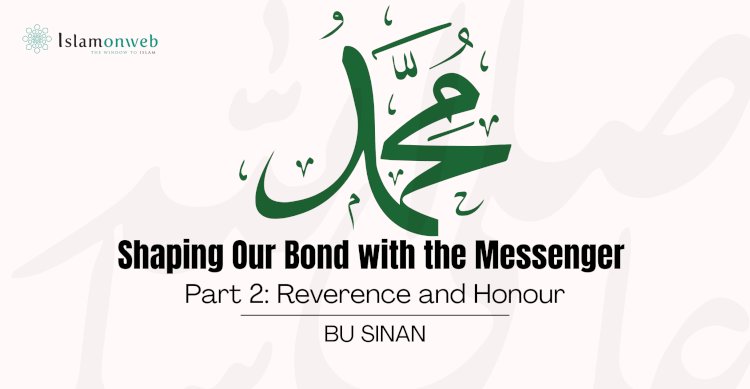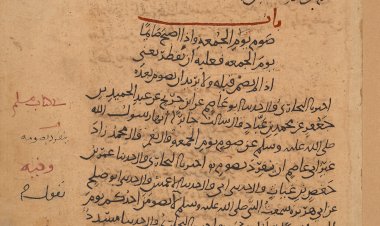Shaping Our Bond with the Messenger ﷺ Part 2: Reverence and Honour
Shaping Our Bond with the Messenger ﷺ – Part 1: Faith and Obedience
Belief and obedience are never complete without reverence and honour for the Messenger of Allah ﷺ. Allah Himself commands:
“Indeed, We have sent you as a witness, a bringer of glad tidings, and a warner, so that you may believe in Allah and His Messenger, support him, and revere him.” (al-Fatḥ 48:8–9)
The Qur’an lays down the etiquette of reverence:
“O you who believe, do not put yourselves forward before Allah and His Messenger, and fear Allah. Indeed, Allah is All-Hearing, All-Knowing. O you who believe, do not raise your voices above the voice of the Prophet, nor speak aloud to him as you speak to one another, lest your deeds be nullified while you do not realise. Indeed, those who lower their voices in the presence of the Messenger of Allah are those whose hearts Allah has tested for piety—for them is forgiveness and a great reward.” (al-Ḥujurāt 49:1–3)
“Do not address the Messenger as you address one another.” (al-Nūr 24:63)
“O you who believe, do not say ‘rāʿinā’ [words of disrespect], but say ‘unẓurnā’ and listen attentively.” (al-Baqarah 2:104)
These verses were revealed to shape the Ummah’s manners with the Messenger ﷺ. His station demands awe, silence, and humility.
The Companions’ Reverence
The Companions embodied these commands with unmatched dignity:
- ʿAmr ibn al-ʿĀṣ رضي الله عنه said: “There was none more beloved to me than the Messenger of Allah ﷺ, and none greater in my eyes. I could never gaze at him fully out of reverence. If I were asked to describe him, I could not, for I never filled my eyes with him completely.” (Muslim)
- Anas ibn Mālik رضي الله عنه narrated: “The Prophet ﷺ would come out to his Companions, among them Abū Bakr and ʿUmar. None of them would raise their eyes towards him, except Abū Bakr and ʿUmar, who looked at him and he looked at them, smiling.” (Tirmidhī)
- Usāmah ibn Sharīk رضي الله عنه described: “I came to the Prophet ﷺ and his Companions were around him, as though birds were perched upon their heads.” (Nasāʾī, Abū Dāwūd, Ibn Mājah, Tirmidhī)
- At al-Ḥudaybiyyah, when Quraysh sent ʿUrwah ibn Masʿūd to negotiate, he witnessed the Companions’ awe: “By Allah, I have seen kings in their courts—Caesar, Chosroes, and the Negus—but I have never seen a king so revered by his people as Muhammad ﷺ is by his Companions. By Allah, whenever he spat, they caught it in their hands and wiped it over their faces and bodies. Whenever he performed ablution, they rushed to take the water. Whenever he dropped a hair, they vied to obtain it. When he commanded, they hastened to obey. When he spoke, they lowered their voices and did not gaze at him directly out of reverence. I have never seen any people honour their leader like the Companions of Muhammad ﷺ.” (Bukhārī)
- Anas رضي الله عنه said: “I saw the Messenger of Allah ﷺ when the barber was cutting his hair, and his Companions stood around him, eager not to let a single hair fall without it landing in someone’s hand.” (Muslim)
This awe was not mere formality; it was faith in action, love embodied in reverence.
Lessons from the Revelation of Manners
The verses of al-Ḥujurāt were revealed in moments that shaped the etiquette of the Companions. When Abū Bakr and ʿUmar once raised their voices before the Prophet ﷺ, the warning came: “Do not raise your voices above the voice of the Prophet…” From that day, Abū Bakr said: “By Allah, I will never speak to you, O Messenger of Allah, except as softly as one whispers to a secret companion.” ʿUmar, thereafter, lowered his voice so much that the Prophet ﷺ sometimes had to ask him to repeat himself.
Thābit ibn Qays, the Prophet’s orator, was naturally loud in speech. When this verse was revealed, he feared his deeds were nullified and secluded himself in grief. The Prophet ﷺ summoned him and assured him: “Would you not be pleased to live honourably, be martyred, and enter Paradise?” Indeed, he was later martyred at al-Yamāmah. (Muslim)
Reverence and Honour in the Generations After
The awe and reverence for the Messenger of Allah ﷺ did not end with the Companions. It flowed through the hearts of the tābiʿīn, the tābiʿ al-tābiʿīn, and the great imams of Islam. Their attitude towards the Prophet ﷺ, his remembrance, and his words reflects the depth of love and honour with which they upheld his station.
Abū Ibrāhīm al-Tijībī said: “It is obligatory upon every believer, whenever he mentions the Prophet ﷺ, or is he mentioned in his presence, to lower himself in humility, calm his movements, and show the reverence due to him, just as if he were standing before him.”
Thus, reverence to the Prophet ﷺ extends to the mention of his blessed name, to his Sunnah, and to his noble mosque and resting place. This springs from love, awe, and recognition of his exalted station with Allah.
Imām Mālik ibn Anas رحمه الله was known for his profound reverence for the Prophet ﷺ. He once said about the great scholar Ayyūb al-Sakhtiyānī: “I have narrated to you from many, but I have not seen anyone superior to Ayyūb.” He then explained why: “I observed him closely during Ḥajj, and I never saw him mention the Prophet ﷺ except that he wept until I felt pity for him. When I witnessed such reverence, I began to write from him.”
Mālik himself, whenever the Prophet ﷺ was mentioned, would change in colour and lower his head until it became difficult for those around him to bear watching him in such awe. When asked about this, he replied: “If you had seen what I have seen, you would not find it strange what you see from me now. I saw Muḥammad ibn al-Munkadir, the leader of the reciters, whenever the Prophet ﷺ was mentioned, he would weep so much that we felt mercy for him.”
He added: “I saw Jaʿfar al-Ṣādiq ibn Muḥammad, who was known for his gentle humour and cheerfulness, but whenever the Prophet ﷺ was mentioned, his face would turn pale out of reverence. I never saw him narrate a ḥadīth of the Messenger of Allah ﷺ except in a state of purity, out of honour for the one whose words were nothing but revelation.” (cf. al-Najm 53:3–4)
ʿAbd al-Raḥmān ibn al-Qāsim, grandson of Abū Bakr al-Ṣiddīq, would grow pale as though blood had drained from his face whenever the Prophet ﷺ was mentioned, and his tongue would dry in his mouth from awe. ʿAmmār ibn ʿAbdullāh, whenever he heard the Prophet ﷺ mentioned, would weep until no tears remained in his eyes.
Muḥammad ibn Shihāb al-Zuhrī, described as one of the most cheerful and pleasant people, would become so overcome at the mention of the Prophet ﷺ that he seemed a different man entirely. Ṣafwān ibn Sulaym, one of the great worshippers, would weep so profusely whenever the Prophet ﷺ was mentioned that people would leave him alone out of mercy for his state.
Qatādah رحمه الله, whenever he heard a ḥadīth of the Prophet ﷺ, would be seized with sobbing and trembling, unable to sit still in one place.
When the Caliph Abū Jaʿfar al-Manṣūr once raised his voice in the Prophet’s mosque, Imām Mālik said to him: “Do not raise your voice in this mosque. Allah forbade a people from raising their voices in the presence of the Prophet ﷺ while he was alive. His sanctity in death is as his sanctity in life.” The Caliph immediately humbled himself.
Imām Mālik, when people crowded upon him for narration, was once asked why he did not appoint someone to repeat his words to the masses. He replied with the verse:
“O you who believe, do not raise your voices above the voice of the Prophet.” (al-Ḥujurāt 49:2)
For him, the words of the Messenger ﷺ, even when transmitted, deserved to be treated with the same etiquette as if the Prophet ﷺ himself were speaking.
ʿAbd al-Raḥmān ibn Mahdī, one of the early imams, whenever a ḥadīth of the Prophet ﷺ was read in his circle, would command silence, reciting the same verse: “Do not raise your voices above the voice of the Prophet.” He explained that the respect owed to the recitation of a ḥadīth was the same respect owed to the Prophet ﷺ when he spoke it in person.
This was the way of the early generations: reverence so deep that it softened their hearts, altered their voices, and even changed their very appearance at the mention of his noble name. Their awe was not outward display but the natural trembling of hearts truly conscious of his rank with Allah.
This article is prepared primarily based on excerpts from Subul al-Hudā wa al-Rashād fī Sīrat Khayr al-ʿIbād, vol. 11, authored by Muḥammad ibn Yūsuf al-Ṣāliḥī al-Shāmī (d. 942 AH).
Disclaimer
The views expressed in this article are the author’s own and do not necessarily mirror Islamonweb’s editorial stance.
























Leave A Comment